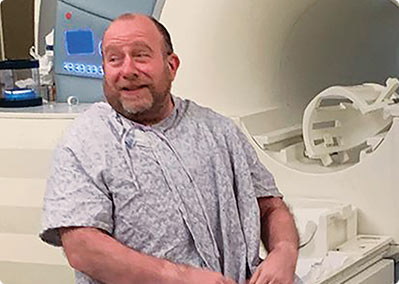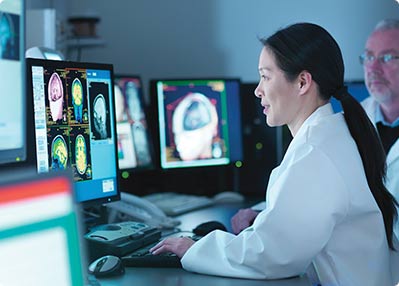
Triple Your Impact This Holiday Season
Triple Your Impact This Holiday Season
Celebrate the holidays with a year-end gift that can go 3x as far to help provide care and support to the millions affected by Alzheimer's disease, and to advance critical research. But please hurry — this 3x Match Challenge ends soon.
Donate NowBrain Donation: the ‘Greatest Gift to Science’
Brain Donation Helps Researchers Continue the Fight Against Alzheimer’s
Brain donation helps researchers continue the fight against Alzheimer’s
 Phil Gutis, a former New York Times reporter, understands the importance of meticulous research. So when he began exhibiting early signs of cognitive impairment at age 54, he jumped at the chance to join a clinical trial — a study that ultimately confirmed he has younger-onset Alzheimer’s.
Phil Gutis, a former New York Times reporter, understands the importance of meticulous research. So when he began exhibiting early signs of cognitive impairment at age 54, he jumped at the chance to join a clinical trial — a study that ultimately confirmed he has younger-onset Alzheimer’s.Inspired to do something positive with this diagnosis, Phil became a dedicated participant in dementia research studies. Before enrolling in a long-term study at Penn Memory Center, he learned that he would be asked to donate his brain after his death.
“It gave me short pause, but then I immediately thought to myself, ‘I’m not going to be using it, so if it can do good, of course,’” Phil says. “I hope my donation will be a small part of that building block toward treatment or a cure.”
Dementia under the microscope
Alzheimer’s and dementia researchers owe a great deal of their progress to postmortem study of the human brain. It was through autopsy that Dr. Alois Alzheimer first discovered the disease’s hallmark changes in the brain more than 100 years ago. More recently, brain donation has shed light on the variety of factors that may contribute to Alzheimer’s and other dementia, allowing researchers to focus their study.Future advances in dementia research largely depend on other people making the same generous commitment as Phil. “I personally think brain donation is the greatest gift a person can give to science,” says C. Dirk Keene, M.D., Ph.D., who leads the BioRepository and Integrated Neuropathology (BRaIN) Laboratory and Precision Neuropathology Core at the University of Washington, based in Seattle. “It has helped us to understand how complex brain aging and dementia really are. We’re still at the frontiers in many ways.”
Scientists can learn a lot from studying the brains of living people through imaging techniques like MRIs and PET scans, but these methods only reveal part of the picture. Examining tissue from donated brains after death provides researchers more in-depth information about changes that occur due to Alzheimer’s — both within specific regions of the brain as well as at the cellular level. The most valuable approach is to first study the brain of a living person through observation and then through autopsy.
Learn more about brain donation
Both healthy brains and brains affected by diseases like Alzheimer's are needed for research.
A coordinated effort
Making plans as early as possible for brain donation is key — both to ensure the prospective donor is able to consent and to make sure researchers get the most out of this precious gift, says Nina Silverberg, Ph.D., director of the Alzheimer’s Disease Research Centers (ADRC) Program at the National Institute on Aging (NIA), part of the National Institutes of Health.
 The ADRCs are a national network of over 30 interconnected research hubs that rely on brain donation to further cutting-edge science. Each center works with study participants to get a more complete picture of factors that may contribute to Alzheimer’s and other dementias — helping scientists draw connections between what they see under the microscope and years of observations about the person’s health and cognitive function.
The ADRCs are a national network of over 30 interconnected research hubs that rely on brain donation to further cutting-edge science. Each center works with study participants to get a more complete picture of factors that may contribute to Alzheimer’s and other dementias — helping scientists draw connections between what they see under the microscope and years of observations about the person’s health and cognitive function.The ADRCs and other brain donation centers, like the National Institutes of Health NeuroBioBank, connect potential donors to “brain banks” (brain repositories) and qualified researchers to brain tissue. While brain donation centers do receive numerous inquiries from people who wish to donate, it is often at the very end of their life, Silverberg says.
“We know that there are changes taking place in the brain decades before symptoms occur, so the research focus has shifted,” Silverberg says. “It’s very important that we have donations from people who aren’t at the very late stage [of Alzheimer’s].”
Looking to the future
It can be difficult to contemplate death, but making the decision to donate your brain is an act of hope. The information gained from a single donated brain can benefit hundreds of research studies. Ultimately, it is a personal choice, but talking it over with family, friends or a trusted faith leader can help.
“I want to make sure that future generations — my nephew and nieces — will not have to deal with this disease. So, I went into the whole thing with an eye toward the future,” Phil says. “It’s a way to let your legacy carry on. And I think that’s the most powerful argument there is.”
To learn more about brain donation and access informative resources created by the National Institute on Aging, the National Institutes of Health NeuroBioBank and other brain donation centers, visit alz.org/braindonation.
Brain Donation FAQ
Q: Who can donate their brain?
A: Anyone over age 18 can consent to donating, and scientists critically need the brains of healthy people as well as those with a brain disease like Alzheimer’s. Researchers especially need to study the brains of individuals from underrepresented groups, such as Black people and Hispanic people.
Q: When should I make plans to donate?
A: As soon as possible. Making plans early allows researchers more time to learn from your brain.
Q: Will my family be contacted after the donation is made?
A: Yes, an autopsy report will be provided to your family, which will include a diagnosis, if applicable.
Q: I’m listed as an organ donor on my driver’s license. Does this include my brain?
A: No, you must make separate arrangements to donate your brain. Visit alz.org/braindonation to learn more about the process.
